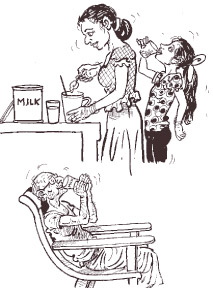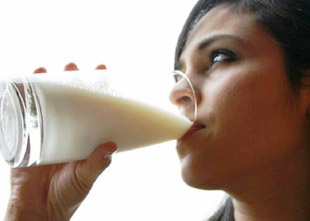|
Confusion reigns over DCD and Botulinum in milk :
Health Ministry says no more ads, calls upon public to drink liquid
milk
by Carol Aloysius
Amidst conflicting views and public confusion over the safety of
certain imported milk food products, the Health Ministry this week told
the public to drink local liquid milk while it began tightening the lid
on imported milk foods. On Wednesday instructions were sent to the
Customs Food inspectors to withhold the release of any imported milk
powders to the market, till they were proved untainted by the agro
chemical Dicyanadiamide (DCD) and Chostridium botulinum, a high
concentrate of Whey Protein.
 The Health Ministry also banned advertisements on all milk powder in
the media (TV, radio, newspapers etc) indefinitely till further tests
proved they were safe for consumption. The Health Ministry also banned advertisements on all milk powder in
the media (TV, radio, newspapers etc) indefinitely till further tests
proved they were safe for consumption.
The following day(Thursday, Aug. 8) the Court of Appeal issued an
interim order restraining Fonterra Brands Pvt Ltd from advertising that
their milk products were 100 percent safe for consumer consumption. The
restraint order was made by petitioner Kamal Saliya Samarasinghe from
Matale who said that Fonterra Brands Pvt Ltd had misled the public into
believing their milk was 100 percent safe for consumption, while being
aware of its hazardous health risks following tests by the Industrial
Technology Institute showing evidence of DCD. To quote advertisements
that appeared in most leading newspapers in the country just prior to
this ban, Fonterra Brands Sri Lanka, stated,” None of the Fonterra
brands sold here contain Whey Protein concentrates. Anchor and all our
other products don’t use this dairy ingredient. Our products are 100
percent safe. None of Fonterra’s branded products was affected by the
quality issue announced by the New Zealand Cooperative on August 3,
2013. This was an isolated issue affecting three batches of a
specialised wholesale dairy ingredient Whey Protein Concentrate 80
(WPC80). WPC80 is marketed by Fonterra as a wholesale ingredient for
food beverage and animal food manufacture as a business - business
transaction.”
Addressing the media Thursday, Fonterra Marketing Director Leon
Clement maintained this stance, and argued that the ITI tests were
inaccurate as the method used by ITI was unscientific, since it did not
have the Femdam Mass Spectrometry Machine to test the milk products for
DCD.
In a telephone interview Human Resources Corporate Affairs, Director
Roshan Kulasooriya told the Sunday Observer, “We have strictly adhered
to the test method followed by the Ministry of Health for food safety.
These are internationally accepted procedures that we have adopted for a
long time. None of the tests on the Ministry of Health guidelines have
shown any trace of DCD. If they were contaminated why didn’t Customs
officials withhold our previously released stocks of imported milk from
New Zealand?”
ITI tested batches
The ITI tested anchor 1 Plus batch No 107610163, anchor Full Cream
batch 0605-C 0883 11-21 produced by Fonterra , Maliban Non Fat Milk
batch No 13074 AI imported by Maliban Milk Products Ltd and Diamond Milk
Powder batch NW1F1PDX1 PM imported by Mohamad Ali Milk Products Company.
All these products tested positive, ITI sources said.
Clements said the company would withdraw the batches said to be
tainted with the agro-chemical within 48 hours from the shelves of
supermarkets, and other retail outlets. HR Director Kulasooriya, in his
interview, however said all the suspect batches estimated to be around
50,000 could be removed from open market shelves within 24 hours as the
Company had already deployed most of its sales force islandwide to do
this.
Food Act
The decision to recall the batches of milk powder said to have DCD
was made by the Director General Health Services Dr P.G. Maheepala using
how powers under the Food Act No. 26 of 1980 and considering the ITI
report. Ministry sources said they will be made available in the market
only after further investigations with the help of the ITI and a leading
lab in Singapore are conducted and the tests prove negative.
|

A glass of milk a day will keep the doctor away! |
Health officials reiterated the need for the public also to switch to
fresh local milk as they were safe and did not contain DCD or Botulinum.
“The two local milk products tested at the ITI so far namely, Highland
Milk powder and Pelawatte milk powder, did not have DCD”, the Government
Medical Officers Association (GMOA) which has pledged to promote local
milks and support, the government said.
Speculation
The Health Ministry’s decision to recall the suspected brands of milk
powder imported from New Zealand and Australia and another country,
while tightening scrutiny on all milk foods including local milks for
DCD and Botulinum, ended weeks of speculation and public confusion as
conflicting reports by the Health Ministry and importing companies and
Industrial Technology Institute (ITI) escalated causing unnecessary
panic and anxiety among consumers.
Mother and housewife Mrs. Neliya Pathirage told the Sunday Observer
she and several other housewives were in a quandary after Anchor full
cream and Anchor 1 Plus as well as Maliban and Diamond were found to
have contaminating agents.” We were anxiously waiting for a final answer
from the Health Ministry to end our confusion so that we could stop
using the milk brands said to be contaminated and switch to other milk
foods”, she said.
Customs
Until Wednesday August 7 customs officials also admitted they were in
the dark as to what the ground situation was as no instructions
regarding inspections of the milk had been sent from the Health
Ministry’s top brass. “Nevertheless they said they were holding the
stocks of imported milk powders in their container yards indefinitely,
and would not be releasing any stocks to the market till such
instructions were received.
When contacted on Friday morning, Director Customs Inspections Leslie
Gamini told the Sunday Observer, “We have now received official
instructions from the Director General Health Services (DGHS), who has
informed our food inspectors to analyse all imported milk powder for DCD
and Botulinum and not to release them until they are proved to be free
of such contaminants.
He also directed all customs officials to be vigilant and to direct
all imported milk powders to authorised officers to be inspected by food
inspectors before releasing them to the market.”
GMOA’s suggestions
The Government Medical Officers Association (GMOA) told the Sunday
Observer that while welcoming the news as a “victory for the GMOA”, it
also wished to inform the public that the Association had written to the
Health Minister to suspend imports of DCD contaminated milk foods after
the ITI under the Science Technology Ministry had scientifically proved
that some brands of imported milk contained DCD.
The sources charged that the Health Ministry had instead accepted the
report issued by a foreign company and issued a media release that the
particular imported milk products were safe thus violating the Food Act
and putting public health at risk. “We hope to take up this matter
soon,” GMOA spokesman Dr. Nalin Herath told the Sunday Observer.
He said, the GMOA has also submitted ten suggestions to the Health
Minister. They include: Promotion of fresh milk; Acceleration of the
Human Nutrition Training Program at the Post Graduate Institute of
Medicine (PGIM); Establishment of a Toxicology Speciality in the Health
system; Establishment of a Toxicological Centre within the Health
Ministry; Establishment of an Inter-Sectoral Committee including all
relevant stakeholders and the GMOA as a partner to promote fresh milk
consumption.
“We have also suggested that future investigations should be done in
collaboration with the ITI which has a state-of-the-art lab, foreign
labs should be used only if the ITI lacks the technology for some
tests”, he said.
He further said the GMOA was also pressing for starting immediate
inquiries against Health officials for making various statements
misleading the public with regard to the toxic substances found in the
imported milk powders.
ITI Chairman Prof. W. Abeywickrama told the Sunday Observer that six
samples of imported milk products and four samples of local milk
products had been tested at the ITI lab. “We found six imported milk
powder were contaminated.
The two local milk samples we tested had no contamination . The tests
are still in progress,” he said. Secretary Public Health Union
Islandwide A.M. Senarath said he and his team of 1,800 food inspectors
are ready to go into all the supermarkets and sales outlets where
imported milk foods are being sold to inspect them for contaminated
substances.
“Samples will be tested in our lab as well as the Medical Research
Institute and Government Analyst Lab”, he said.
Health Ministry spokesman W. Wanninayake however said that the
removal of the suspect milk powders would be the responsibility of the
companies importing them.
“The Health Ministry need not waste money on this exercise. The
companies themselves will have to remove the milk powders found to be
contaminated”, he said.
He said that the Provincial and Regional Health Directors, the
Colombo Municipal Council Chief Medical Officer, and officers from the
National Institute of Health Sciences had been informed via a circular
that they should oversee that the companies carry out their
responsibility well.
“We will be sending a few of our own inspectors as well to observe
and see that everything is done properly”.
GMOA spokesman Dr. Herath however said that any circular sent to the
Provincial and Regional Directors of Health in this respect would have
to be first studied carefully. “We have to see if they meet our
requirements”, he stressed.
Health hazards
Asked about the health hazards of posed by DCD Fonterra sources told
the Sunday Observer, “Any toxicity level found in the milk powder is “
very minute - far less than the tolerable limit set by international
standards.” They quoted a report by food safety experts citing the 2012
Journal of Chromatography - as an example.
Local health specialists however insist that toxicity even in a
minute form is harmful to the body. “ DCD is an agro- chemical”, Dr.
Nalin Herath said. ‘It is poison.
There is no mild term to describe poison. A Consultant Paediatrician
from the Kalubowila Teaching Hospital observed that although the effects
of toxicity consumption in milk would not be immediate since they were
relatively in very low dosages, still in the future Sri Lanka could have
a population suffering from illnesses of unknown origins which could be
traced back to DCD.
She said that it was too early to comment on Botulinum since it was
something very new and required much more study.
Will the importers of the suspect brands comply with the orders given
them by the Health Ministry and how soon? As the public awaits the
outcome Health Ministry sources said it was up to the Regional and
Provincial Council Directors and others overseeing the exercise to make
sure every single suspect brand is removed from the open market.
“All of them can go into any market and inspect the shelves as they
are authorised to do so”, a spokesman said. A question also being asked
is, if the public takes the Health Ministry’s advice to heart, will
there be enough to go round? And, will this milk be completely free of
contamination and adulteration? |


